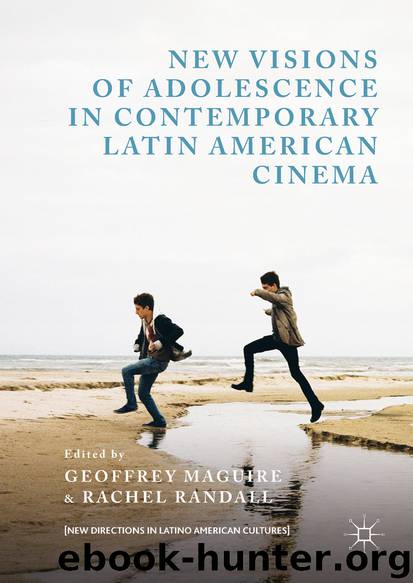New Visions of Adolescence in Contemporary Latin American Cinema by Geoffrey Maguire & Rachel Randall

Author:Geoffrey Maguire & Rachel Randall
Language: eng
Format: epub
ISBN: 9783319893815
Publisher: Springer International Publishing
The Crisis of Hegemonic Masculinity
Jean’s ultimately unsuccessful romantic relationship with Luiza, uncertainty about his future career path, and inability to settle on which subject he should study at university, symbolise a broader crisis of hegemonic masculinity in Brazil. Michael Kimmel defines ‘hegemonic masculinity’ as ‘the image of masculinity of those men who hold power’, that image being the one usually associated with men who are (among other things) young, urban, white, heterosexual, fully employed, successful at sports and (possibly) fathers (1994: 125). Jean’s repeated mirroring of his father Hugo—who would embody ‘hegemonic masculinity’ were it not for his unemployment and impending bankruptcy—together with the film’s repeated references to Freyre ’s national, historical framework, indicate the broader symbolic implications of these characters’ private and professional crises. As Pateman ’s delineation of the fraternal social contract would suggest (1989: 43–45), their struggles are manifested in their inability to perform hegemonic masculine roles in a public capacity, which leads to their failure to exert authority via their fraternal bonds with other men. This is exemplified in Jean’s case by the fact that his male friends constantly tease him, in particular when he does not succeed in kissing any girls on a night out at a club. His teenage insecurities are a particularly compelling way of exploring this crisis of masculinity because, as Michael Messner points out, male adolescence is ‘probably the period of greatest insecurity in the life course, the time when the young male becomes most vulnerable to peer expectations, pressures and judgement’ (1987: 199).
The film’s socio-political critique reaches its apex when Jean brings Luiza to a barbecue at his family home, hosted by his parents . The conversation turns from a discussion of which subject Jean is planning to study at university to an argument about the recent federal approval of the quota-based system for the allocation of places at public institutions. Luiza is eligible for a quota place, and is preparing to sit the vestibular alongside Jean. In a microcosmic representation of the class-based and political polarisation that has recently divided Brazil, the debate about quotas ultimately pits her against Hugo, who is made to personify a neoliberal ideology when he claims that all he has achieved is a product of his own merit and strength in the face of adversity. Luiza, on the other hand, reminds the guests of the extreme levels of racial and socio-economic inequality that continue to blight Brazil, which, together with a poor state secondary school system, necessitate affirmative action in the distribution of public university places. The scene dispenses with any uncertainty as to the film’s stance on quotas, yet in order to do this, as De Luca has also noted, it ‘has to sacrifice nuance and wit for a certain didacticism’ (2017: 210). The film does not skirt the fact that the ‘democratization’ of race relations, which Freyre identified as a unique characteristic of Brazilian reality, ‘has not translated into social and economic inclusion’, since black and mixed-race Brazilians are much more likely
Download
This site does not store any files on its server. We only index and link to content provided by other sites. Please contact the content providers to delete copyright contents if any and email us, we'll remove relevant links or contents immediately.
Call Me by Your Name by André Aciman(20501)
Ready Player One by Cline Ernest(14645)
How to Be a Bawse: A Guide to Conquering Life by Lilly Singh(7472)
Wiseguy by Nicholas Pileggi(5771)
The Kite Runner by Khaled Hosseini(5170)
On Writing A Memoir of the Craft by Stephen King(4937)
Audition by Ryu Murakami(4924)
The Crown by Robert Lacey(4808)
Call me by your name by Andre Aciman(4676)
Gerald's Game by Stephen King(4642)
Harry Potter and the Cursed Child: The Journey by Harry Potter Theatrical Productions(4503)
Dialogue by Robert McKee(4389)
The Perils of Being Moderately Famous by Soha Ali Khan(4217)
Dynamic Alignment Through Imagery by Eric Franklin(4209)
Apollo 8 by Jeffrey Kluger(3705)
The Inner Game of Tennis by W. Timothy Gallwey(3682)
Seriously... I'm Kidding by Ellen DeGeneres(3629)
How to be Champion: My Autobiography by Sarah Millican(3591)
Darker by E L James(3512)
